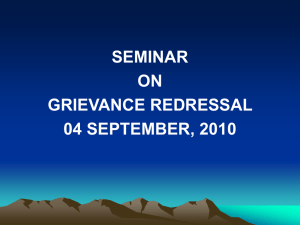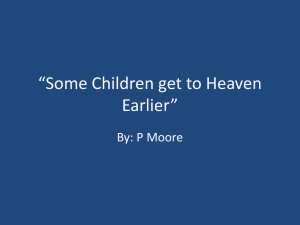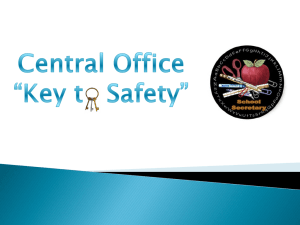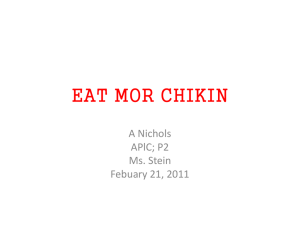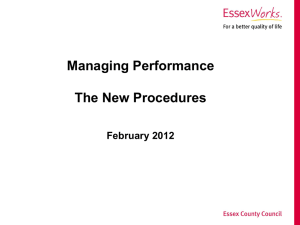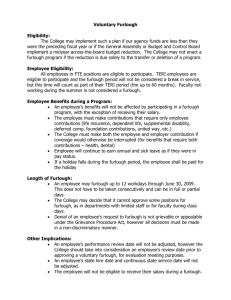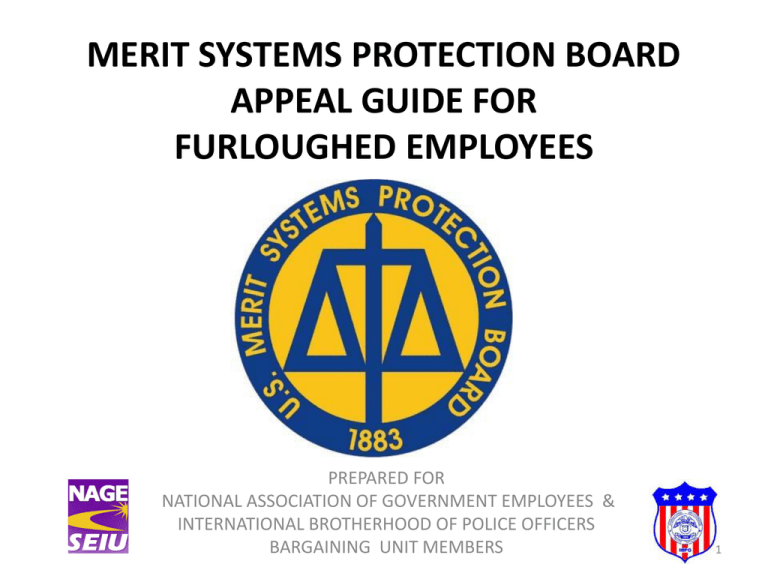
MERIT SYSTEMS PROTECTION BOARD
APPEAL GUIDE FOR
FURLOUGHED EMPLOYEES
PREPARED FOR
NATIONAL ASSOCIATION OF GOVERNMENT EMPLOYEES &
INTERNATIONAL BROTHERHOOD OF POLICE OFFICERS
BARGAINING UNIT MEMBERS
1
PURPOSE OF THIS GUIDE
To provide NAGE and IBPO bargaining unit employees with
guidance on filing individual appeals with the Merit
Systems Protection Board (MSPB) concerning their
employing Agency’s decision to institute furloughs.
This guidance is prepared for the benefit of the nonattorney pro se Appellant. Because each individual’s
circumstances may vary with regard to the decision to
furlough and basis for appeal, no single sample appeal will
apply in all situations. If you decide to appeal the decision
to furlough your position, please include all relevant facts
and claims relevant to your particular circumstances.
IN REVIEWING THIS APPEAL GUIDE
WHERE YOU SEE BLUE UNDERLINE, PLEASE CLICK THROUGH FOR MORE INFORMATION2
WHAT IS THE MSPB?
The Merit Systems Protection Board is an
independent, quasi-judicial agency in the Executive
branch that serves as the guardian of Federal merit
systems. In its oversight of the personnel practices
of the federal government, the MSPB hears and
decides appeals of agency adverse actions. A
furlough of 30 days or less is considered an adverse
action and may be appealed to the MSPB.
WWW.MSPB.GOV
3
WHEN WILL THE MSPB OVERTURN AN
AGENCY’S DECISION TO FURLOUGH
A furlough of 30 days or less must be undertaken for cause, promoting
the efficiency of service.
A furlough will be overturned if it is deemed to be not in accordance
with law or contain harmful procedural error.
NOTE: The agency has the burden of proving that it was justified in
issuing the furlough. If the agency meets its burden of proof, the Board
must decide in favor of the agency, unless you show that there was
harmful error in the agency's procedures, that the agency decision was
based on a prohibited personnel practice, or that the decision was not
in accordance with the law.
4
CLAIMS BEFORE THE MSPB RELATIVE TO THE
DECISION TO FURLOUGH YOUR POSITION
Appellate Jurisdiction:
Furloughs of 30 days or less are considered adverse actions 5
U.S.C. §7512 and are appealable to the MSPB.
Additional Jurisdiction:
If applicable, you may make additional claims whens when
appealing an adverse action. Additional claims can include: a
claim that the action you are appealing, the furlough, was the
result of a prohibited personnel practice 5 U.S.C. §2302(b); that
the action violates Veterans Preference pursuant to the Veterans
Employment Opportunities Act (VEOA); or that the action
violates the Uniformed Services Employment and Reemployment
Rights Act (USERRA). . You may also claim that the agency
committed a harmful procedural error or that that the action is
unlawful in its entirety.
5
PROHIBITED PERSONNEL PRACTICES
An Appellant Who can Prove That He or She Was Treated Differently
Has a Higher Likelihood of Success
Unlawful Discrimination: A claim that the furlough action was
based upon race, color, religion, sex, national origin, disability, age,
marital status, political affiliation, genetic information and
retaliation for prior EEO activity.
Retaliation for Whistleblowing Activity: A claim that the furlough
action in retaliation for disclosure of information the Appellant
reasonably believed demonstrates a violation of law, rule, or
regulation, gross mismanagement, gross waste of funds and
retaliation for whistleblowing activity (i.e. participating in an
investigation).
Retaliation for other Protected Activity: A claim that the furlough
action was taken in retaliation for the exercise of a right such filing
an appeal, complaint, or grievance.
6
HARMFUL PROCEDURAL ERROR
AND
NOT IN ACCORDANCE WITH THE LAW
Harmful Procedural Error: Error by the agency in the application of its
procedures that it is likely to have caused the agency to reach a
different conclusion than it would have reached without the error. 5
C.F.R. §1201.56(c)(3). (i.e. failure to provide required notice or
opportunity to respond).
NOTE: Although if the Agency fails to give you the required minimum
of seven (7) days to respond to the proposed notice, or fails to give you
a minimum of 30 days notice of the final determination is considered a
procedural error, the Agency would most likely only be ordered to
reissue the furlough, not to rescind it all together.
Not In Accordance with the Law: A claim that the agency’s action was
unlawful in its entirety, that is, there is no legal authority for the
action.
7
EFFICIENCY OF SERVICE
As discussed previously, the action of furloughing
an employee must promote the efficiency of
service. The efficiency of service requirement
relates to the 5th Merit System Principle – the right
to an effective and efficient government.
In furloughing your position, Management will
allege that the furlough promotes the efficiency of
the service by avoiding a deficit of funds.
8
WHEN MSPB WON’T OVERTURN
If the Agency successfully meets its burden, the MSPB will not
overturn the furlough. The agency meets its burden by
demonstrating that the furlough was a reasonable
management solution to financial restrictions and that
management selected the employees to furlough fairly. Clark
v. Office of Personnel Management, 24 MSPR 224 (MSPB
1984). Therefore management’s discretion in conducting a
short-term furlough will not be disturbed without a showing
of disparate treatment among similarly situated employees.
Clark. Further, MSPB decisions have upheld furloughs where
Congress has specifically reduced funding in a certain area
and furloughs have nonetheless been applied to all positions.
Clark.
9
WHEN TO FILE
Appeal must be filed within thirty (30) days of the effective date of the furlough, which
means the first furlough day served, of the adverse action, or within 30 calendar days
after the date of receipt of the agency's decision, whichever is later.
Appeals that are filed early, before you have served the first furlough day, will be
rejected as premature.
The filing date is determined by the date the appeal is postmarked, faxed, filed
electronically, or submitted to a commercial delivery service.
Failure to timely file an appeal will most likely result in the MSPB dismissing the case
unless you have a good reason for the delay. This is a very difficult standard to meet.
Please note: Some local contracts may allow for employees to file a grievance over the
furlough, however, you may only file a grievance or an MSPB appeal, but not both.
Your contract must allow for you to file a grievance over the furlough in order for you
to do so and contains its own timelines that must be followed for the grievance to be
valid. Please contact your local officials before filing a grievance over the furlough and
review your CBA to determine any restrictions and timelines.
10
HOW TO FILE
Electronic Filing: MSPB provides an efficient e-filing
system that allows the parties to file and access all
documents relevant to the appeal. See www.eappeal.mspb.gov
Filing by Mail, Fax, or Commercial Delivery: File Initial
Appeal Form and supporting documents in hard copy
form.
Documents to Include: Proposed and Final Decisions and
SF-50 if available.
BE SURE TO SIGN YOUR APPEAL
11
WHERE TO FILE
http://www.mspb.gov/contact/contact.htm
12
PROCEDURAL REASONS THE MSPB
MAY REJECT AN APPEAL
• The Appeal is premature
• Filed by someone other than the Appellant without
authority
• Appeal does not contain contact information for the
Appellant or Agency
• Appeal does not contain a description of the action being
appealed and effective date
• The Appeal is not signed
• If filed by mail, the Appellant did not file two copies
• Filed on wrong size (any size other than 8.5 x 11) paper
• Employee filed a grievance over the issue (if applicable
under the Local’s CBA).
FOR MORE INFO
13
APPEAL PROCESS
Broida, Writing for the MSPB, FELTG 2009
14
INITIAL CASE PROCESSING
Acknowledgement Order (typically issued within few days of filing):
• Sets forth responsibilities of the parties related to discovery,
motions practice, attempts at settlement.
• Reminds Appellant to request a hearing if so desired and not
requested in initial appeal form
• Although a form order, the acknowledgement order must be read
carefully to ensure you are meeting the requirements set for by the
administrative judge.
Show Cause Order: Typically issued when after initial review the
Administrative Judge has reason to believe that the MSPB does not
have jurisdiction and will request additional information from the
Appellant. Appellant and/or Agency are required to provide additional
evidence responsive to the order.
15
AGENCY APPEAL FILE
Within 20 days of the Acknowledgement Order,
the Agency provides the Administrative Judge
and Appellant its response to the Appeal and
the Agency Appeal File.
The Agency Appeal File will include
documentary evidence by the Agency to support
its action.
16
DISCOVERY
• Written Discovery Requests: Must be served on the Agency within
30 calendar days of the date of the acknowledgement order. When
drafting and sending discovery, the documents or information you
request should be relevant to the furlough and/or why you believe
that the furlough of you is unlawful or contained a harmful
procedural error.
• Depositions: A deposition is an interview on the record. While
depositions can be helpful in some limited cases, it is not
recommended that you attempt conduct a deposition in these
instances unless you believe there is specific evidence that can only
be shown through someone’s testimony and no documentation
regarding the issue exists.
• Motions to Compel Discovery: Asks the judge to force the other side
to respond. Must be filed within 10 days of the date the response to
a written discovery request was due. Parties do not have authority to
grant extensions of time.
17
PREHEARING SUBMISSIONS
Prior to a hearing, the judge will order that the parties
supply him or her with pre-hearing submissions in
preparation for the hearing and prehearing conference.
Those submissions should:
• Restate relevant facts
• Reiterate all claims and defenses
• Be a submission of all documentary evidence that you plan to
rely upon in the hearing
• Identify proposed witnesses and their expected testimony.
NOTE: You should be prepared to state why each witness and piece of
evidence you provided in your prehearing submission is relevant to the case
during the prehearing conference.
18
THE HEARING
• The hearing is before an administrative judge
• A transcript of the hearing is made through a court reporter
• At the administrative judge’s discretion, you may present an
opening & closing statement
• Each side will be allowed to present evidence, witness
testimony, and to cross examine the other’s sides witnesses
• The judge may rule from the bench or issue a written decision
a short time after the hearing
• If the Appellant/Employee fails to appear, the hearing will be
cancelled and decision issued on the record. If the Agency
fails to appear, the Appellant/Employee will be allowed to
present evidence.
19
SETTLEMENT AND APPEALING THE
DECISION
• Although you may always pursue settlement in an
MSPB appeal and the MSPB generally encourages
settlement, it is highly unlikely that an agency will be
willing to discuss settlement of appeals over the
furloughs. You may inquire with the agency
representative over their desire to settle.
• If you are unsuccessful in your appeal, you may appeal
the decision within 35 days after the date of the
decision or within 30 days after you receive the initial
decision, whichever is later, by filing a petition for
review with the three (3) member Board in
Washington, DC.
20
RESOURCES
(Click on the Link)
www.nagefederal.org
WWW.MSPB.GOV
INITIAL APPEAL FORM
MSPB JUDGES’ HANDBOOK
MSPB FREQUENTLY ASKED QUESTIONS
21




